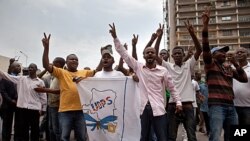In the Democratic Republic of Congo, the ruling party is scheduled to hold talks with the opposition Labor Party today (Monday), following violence that left at least one dead and three injured.
The meeting will be held in Bujimai in the province of Kasai-Oriental, near the border with Angola. The talks will be mediated by the region’s governor.
Observers warn of the increasing potential for violence between supporters of political rivals in the next few weeks.
“To mend fences and to try to make peace, the opposition…is scheduled to meet the governor today Monday to iron out their differences after the killing of this person and the wounding of three others,” said Madnodje Mounoubai, spokesman for the United Nations Stabilization Mission in the Democratic Republic of Congo (MONUSCO).
He also says as part of its mandate MONUSCO is helping to provide security ahead of the November 28 general elections.
“We have trained about 6,000 policemen because we want the police to be better equipped in crowd control [and] not to use lethal weapons when it comes to controlling demonstrations,” said Mounoubai. “We have conducted a lot of workshops and seminars on human rights and freedom of expression and freedom of assembly.”
Mounoubai said MONUSCO is working with political parties and civil society groups to help ensure a peaceful election.
Under a memorandum of understanding between the government and MONUSCO, U.N. forces will also help the Independent National Electoral Commission organize the vote.
“The mission is doing everything possible to give this support to the electoral commission through strengthening our air assets and also giving priority to the transport of electoral materials on all our airplanes,” said Mounoubai.
Official campaigning began last Friday, ahead of the polls. Ten aspirants will be challenging incumbent Joseph Kabila for the presidency.
Meanwhile, some opposition parties are expressing concern Mr. Kabila is undermining their campaigns after he allegedly chartered all private aircraft operating in the country. The move, they assert, effectively prevents them from campaign in rural parts of the country, which are not easily accessible. But, supporters of the president say the accusation is baseless.




